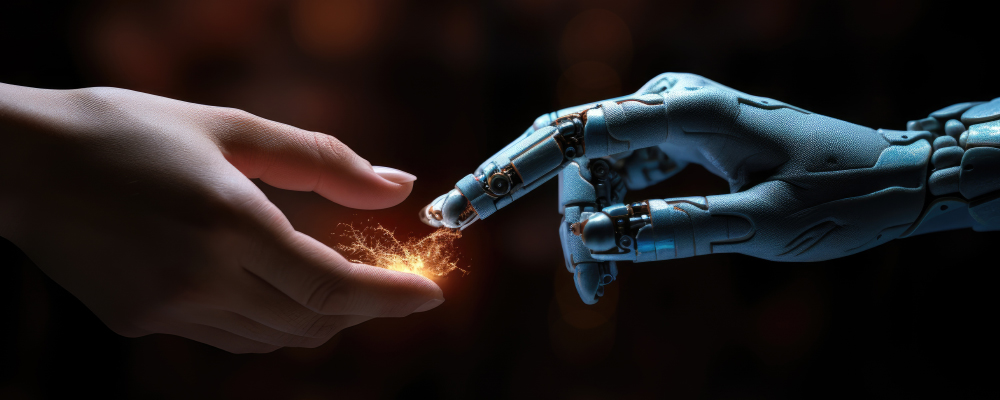
Generative AI and Soft Skills
The rapidly advancing applications and technological developments in generative AI are producing so much heat today that they can be said, counting from the first AI boom in the 1960s, to be in the infancy of a fourth boom. Specifically, the release of GPT-4 in March 2023 was an inflection point that has sparked breathtakingly fast growth in interest and worldwide expansion. In the private sector as well, individual companies have seized the initiative to develop use cases aimed at improving internal operating efficiency, to formulate rules and governance models on the appropriate use of AI, and to create infrastructures for internal AI environments, and have otherwise begun discussions of AI integration with such ardor and unanimity that consulting firms and IT vendors do not need to recommend it. In my conversations with clients, I have seen many senior managers who are experimenting with ChatGPT on their personal smartphones. The overall impression is of a boom that will be slightly different in character from past AI booms, which were spearheaded by IT divisions and particular experts.
The Future of User Interfaces Created by AI and Robotics
Amazing developments are also being seen in the integration of AI and robotics. In 2022, the “Ameca” humanoid robot by Engineered Arts garnered major attention in her debut at the “CES2022” advanced technology trade show. When passing attendees spoke to Ameca, she would begin responding immediately, often looking at her hands in mid-conversation and then looking up and to the right to give replies (this seems to be a habit unique to Ameca). When she noticed she was being recorded by people around her, she would look slightly bashful, smile, and hold out her hand. Sometimes, she would even tell jokes to hit back at mildly obnoxious questions. The video of her was so absorbing that I lost all track of time watching it.
Progress in AI and robotics technologies has been said to promise revolutionary change in user interfaces.
Since 2007, when Apple “reinvented the phone” with the launch of the first iPhone, old and long-established communication interfaces were “swiped” away. Likewise, as AI becomes incorporated in various devices, it will create possibilities for interpersonal, interorganizational, and intraorganizational communication to be “reinvented” yet again. Vision Pro, which Apple is scheduled to begin selling in 2024, is a “spatial computer”, and not simply “goggles” that let users experience AR and VR. This device enables immersive experiences in which the senses humans use to perceive the world (currently vision, hearing, and touch) are synthesized into a direct interface without the mediation of text or icons, thus allowing “another me” to emerge in digital space. Likewise, at Engineered Arts, Ameca is a cutting-edge AI-equipped humanoid robot and is valued as an optimal platform for human-robot interaction (HRI). The future of user interfaces looks extremely bright and is poised to produce major changes in people’s everyday lives and in business.
Generative AI Will Strengthen “Soft Skills”
What possibilities lie as an extension of these technological advances? I believe that AI-equipped interactive interfaces will serve not only to extract data from the behaviors and emotions of the people we interact with, but to nurture and strengthen the “soft skills” we all develop through interaction. Hard skills (cognition, problem solving ability, etc.) are the skills people use to solve multiple-choice or true-false problems, and most core company operations fit into this category. Put differently, these are operations where a correct process is carried out repetitively, at scale, and at high speed. Going forward, these operations will be increasingly phased out with the progress of IT integration and mechanization, contributing to improved productivity for corporations.
However, soft skills (communication skills, empathy, contextual understanding, etc.) also have a vital influence on everyday life and social activity, and these skills are believed to be refinable only through interaction and communication. For example, when the appeal of a brand is communicated, customer loyalty is secured by evoking sympathy with the history or story behind the product. Even in reception desk services at long-established luxury hotels, the ability to provide highly pleasing services depends on the ability to build relationships with important customers and to understand their lifestyle/backgrounds, tastes/preferences, and thinking. In fact, I have heard that the wealthy Europeans who use such hotels see great value in making reservations in person at the front desk, even if this requires extra time and effort. In the education field as well, student motivation is significantly impacted not only by “what I’m learning” but by “who I’m learning from” – I know from my own childhood that this is true. Soft skills can be thought of as the contextual understanding and capacity to sympathize that we develop through such interactions.
The reality today is that AI and robotics are continuing to spread and evolve, and that the age of their utilization in all aspects of corporate activity is not at all far away. This means that there will be advancements in the automation and streamlining of hard skills, but also that the strengthening of soft skills will emerge as a new business challenge for the enhancement of corporate competitiveness. Generative AI is already being utilized as a tool to improve soft skills, and its potential in that area is immense. It is even possible that AI itself will imitate some human soft skills, and thus develop and strengthen itself through its interactions with humans.
By working together, AI and humans can help create a smarter and more efficient business environment.
Profile
-
Kotaro Gunji
* Organization names and job titles may differ from the current version.